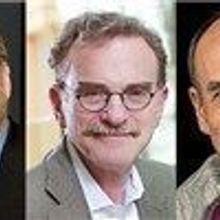 James Rothman, Randy Schekman, Thomas Südhof (left to right)NOBELPRIZE.ORG, H GOREN © HHMI, FISCHThe Nobels
James Rothman, Randy Schekman, Thomas Südhof (left to right)NOBELPRIZE.ORG, H GOREN © HHMI, FISCHThe Nobels
James Rothman, Randy Schekman, and Thomas Südhof shared the Nobel Prize in Medicine or Physiology this year for their independent contributions to understanding the organization of how vesicle contents are discharged at the cell membrane. “They’re three very different people. Each is very intelligent, very purposeful, and driven,” Bill Wickner from Dartmouth College told The Scientist. “I love each one of them. They’re fun, they love to talk shop. They're good listeners as well as speakers.”
Martin Karplus, Michael Levitt, and Arieh Warshel shared the Nobel Prize in Chemistry for the development of computer-based methods to model complex systems. “Computer models mirroring real life have become crucial for most advances made in chemistry today,” the Royal Swedish Academy of Sciences said in a press release.
 Martin Karplus, Michael Levitt, Arieh Warshel (left...
Martin Karplus, Michael Levitt, Arieh Warshel (left...
The Laskers
Genentech’s Richard Scheller and Nobel Laureate Thomas Südhof from the Stanford University School of Medicine won the 2013 Lasker Award for basic medical research. Scheller and Südhof were honored this year for their discoveries related to rapid neurotransmitter release.
In memory
January 27: Kuan-Teh Jeang, the editor-in-chief of the open access journal Retrovirology
February 19: Jane Cooke Wright, a pioneer in chemotherapy
February 28: Donald Glaser, who invented a device called the bubble chamber to track the paths of subatomic particles
March 3: Zora Brown, a champion of breast cancer awareness in the African-American community
April 10: Sir Robert Edwards, whose research led to the birth of the first test tube baby
April 19: Francois Jacob, bacterial geneticist who helped pioneer the study of gene regulation
May 4: Christian de Duve, who won the 1974 Nobel Prize in Physiology or Medicine for discovering lysosomes
May 4: Emil Frei III, a cancer researcher who in the 1950s combined multiple chemotherapy drugs to treat childhood leukemia
June 6: Jerome Karle, father of crystallography
July 18: Bill Bowman, champion of modern anesthetics and the founding professor of pharmacology at Strathclyde University in Glasgow
July 24: Virginia Johnson revolutionized the treatment of sexual dysfunction and helped legitimize the study of copulation and masturbation physiology.
July 26: Obaid Siddiqi, regarded as one of the founders of modern biology in India
August 7: Tony Pawson, whose team was the first to report the specific protein interactions underlying cellular signal transduction
August 15: Peter Huttenlocher, the neurologist who discovered that synapse growth peaks in early childhood
August 26: David Barker, the physician-scientist who connected conditions in the womb and just after birth with chronic health problems in adulthood
September 12: Candace Pert, who helped discover opioid receptors
September 22: David Hubel, who helped revolutionize the understanding of visual information processing
September 23: Ruth Patrick, who pioneered freshwater pollution monitoring
October 11: Monica Riley, who led groundbreaking work studying the E. coli genome
October 31: Leonard Herzenberg, who helped to develop the first fluorescence-activated cell sorter
November 19: Frederick Sanger, who pioneered amino acid and DNA sequencing techniques
November 21: Fred Kavli, the physicist, entrepreneur, and philanthropist who dedicated much of his life to supporting scientific research
December 17: Janet Rowley, who earned fame for linking chromosomal abnormalities to cancer in the 1970s
Interested in reading more?




